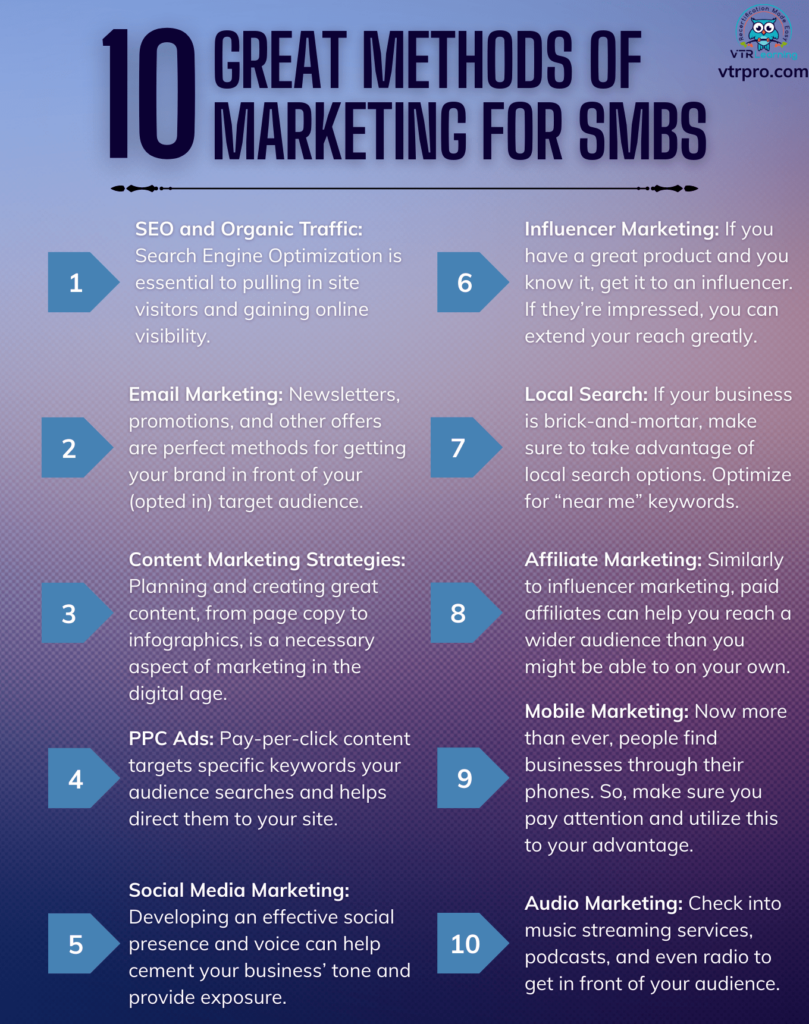![Online Marketing for Small Business [10 Great Methods]](https://assets.vtrlearning.com/wp-uploads/2024/05/Online-Marketing-for-Small-Businesses.png)
In this increasingly virtual age of business, your organization can’t afford to ignore digital marketing. In fact, online marketing for small business products and services might be exactly what catapults you toward the forefront. And often enough, that’s exactly what it takes to grab your audience’s attention and show them what you can do.
Of course, that doesn’t necessarily mean your organization will become an overnight success – although, that does occasionally happen. However, more often you’ll achieve a sort of slow burn that, in hindsight, highlights a specific point in time where your business took off toward success.
But you don’t have to take our word for it – we’ll just show you our own experience. The image below depicts our organic traffic growth over the past three years. May of 2021 (circled in blue) is where we decided to start an increased focus on SEO and online marketing tactics. Obviously, we’ve seen immense improvements since the beginning of this effort.

However, knowing that you should be more invested in online marketing for small business success is far different from actually doing the job. And admittedly, understanding how to get started can be somewhat difficult, especially when you don’t know what methods of virtual marketing work best. So, we’ve broken down ten of the best methods to help you out.

Share this Image On Your Site
10 Best Methods of Online Marketing for Small Business
1. SEO and Organic Traffic
Let’s dive right into SEO, since we already mentioned how it has helped us with our organic traffic. At the very least, you should recognize “SEO” stands for Search Engine Optimization. Essentially, it represents the processes of tweaking different aspects of your webpages so they rank higher than competitors in Google and other search engines. And if that sounds complex, we might as well admit, it can be fairly intensive. In fact, some companies choose to outsource this to developers or marketing agencies to avoid having to deal with it.
However, it doesn’t have to be entirely over your head. Especially if you simply take the time to understand what ranking signals search engines usually look for. It’s also helpful to understand the differences between three different types of SEO.
- Technical SEO: Largely includes “behind the scenes” aspects, such as site structure, internal links, site speed, and other metrics.
- On-Page SEO: Typically focuses on content-oriented aspects, such as readability, user experience, images, and more.
- Off-Page SEO: Generally regards the promotion of your site on pages not under your domain, such as social media, backlinks, and reviews.
Of course, if you’re new to the world of SEO, these mere descriptions might send your head spinning. So, you might find it helpful to take a basic SEO course from Ahrefs or another reputable site. At the very least, it can help provide a baseline understanding for site optimization to increase online visibility.
2. Email Marketing
More than likely, you’ve signed up to receive newsletters from a website before. Alternatively, you might have given a site your email to access a study or report they’d published. Regardless, the result of giving away your email address achieves one specific goal. They can then add you to their mailing lists and keep in touch.
Unfortunately, this form of online marketing for small business growth has become something of a touchy subject in recent years. Because of new privacy laws, such as GDPR, businesses must be careful in their tactics. Otherwise, they might find themselves on the wrong end of an expensive penalty. However, even with the increase in compliance regulations and privacy expectations, email remains a prime method.
Exactly how your organization goes about emailing potential and existing customers might differ from other businesses. And that’s fine – as long as you do so ethically. Even so, you should recognize the two main types of email marketing: cold reach-outs and inbound tactics.
You might already know about “cold” reach-outs, because they aren’t specific to email marketing. Whenever you receive a phone call from a telemarketer, what we usually understand as spam, it’s considered cold. That’s because there’s no previous interaction helping to warm the relationship.
Alternatively, inbound marketing efforts include those mentioned above – when you provide your email to a company at your own discretion. Then, as a result, that organization can send you information. Think about the differences like this: the company starts the sales process with cold emails. However, the customer begins the process with inbound.
Ultimately, the market seems to be heading toward inbound marketing as the preferred form. So, you’ll need to work on ethical ways of building your email lists. That way, you can start building a stronger brand image.
3. Content Marketing Strategies
Generally, content marketing strategies form a method of online marketing for small business that’s closely related to SEO. Essentially, great content helps set your site apart through increased EEAT.
- Experience
- Expertise
- Authoritativeness
- Trustworthiness
Generally, digital content comes in various forms, ranging from videos and infographics to blogs, articles, and site copy. More or less, content encapsulates the wide range of material you employ to promote your business. Moreover, your site’s content can aim to accomplish many different goals.
For example, you might publish an “About Us” page that helps introduce your organization’s team to your audience. Through biographies, you could cement your EEAT in one place. And the more quality content you have that helps provide these assurances, the better.
Of course, in recent years, there’s been a major increase in the prevalence of AI-generated content. And in some ways, this has become frustrating. Many businesses attempt to capitalize on these tools to create content more efficiently. However, one limitation of AI is that it only regurgitates and reorganizes existing material. In other words, it doesn’t have an original thought of its own.
So, when writing your content, make sure you take an active stance. After all, search engines and users can tell the difference between quality, original content and AI-written material. That said, if you still want to employ it in some manner, one helpful trick is to let AI create a blog outline and then fill it in with your original writing.
Surely, other AI methods out there can also help, but keep as a rule the idea that these tricks only take your company so far. In other words, don’t sacrifice quality for efficiency.
4. PPC Ads
If you’ve ever searched on Google, then you already know what a PPC ad is, even if you don’t recognize the term. Pay-per-click is a format of advertising that charges organizations ever time a user clicks their ad. These are often found at the top of search results pages, and Google typically lists them as “sponsored”.
Similarly to SEO, you create ad content, and then determine appropriate keywords. Then, when searchers use those keywords, they might see your ad. Because this concept can become somewhat confusing for beginners, it helps to read through a guide to PPC before attempting it.
However, once you have it down, you can expect PPC advertising to help increase sales, generate leads, and aid brand awareness. Even if searchers don’t end up clicking on your ads, the very fact that they see your company’s name associated with specific terms helps cement you as a leader in your particular industry. And while this method of online marketing for small business doesn’t can grow slowly, you might still want to check it out.
5. Social Media Marketing
Now, we might as well mention this from the start – social media marketing doesn’t work well for every company. Especially those which service a niche that isn’t commonly known. Our own experience proves this point well. Continuing education isn’t necessarily something business professionals look forward to, and they don’t always want to follow Facebook pages dedicated to it.
However, you shouldn’t take that as a rule of thumb. Just because your product only appeals to a particular segment doesn’t mean that audience won’t want to see it on social. Especially if you find a way to establish a great and memorable presence there.
As such, it could take a creative individual to really boost your audience through social media. But depending on your industry, it could be immensely beneficial. After all, an estimated 5.17 billion individuals use social media worldwide. And if your product or service applies to a multitude of people, what better place to land in front of them?

6. Influencer Marketing
Closely related to the topic of social media marketing is that of influencer marketing. At its core, this method of online marketing for small business involves well-known individuals talking about your product or service. While these individuals could be well-known, that’s not the main point. Rather, you’re looking for someone who already has a large following and can present you to that audience.
Moreover, influencer marketing doesn’t necessarily suffer from the same pitfalls as regular social media marketing. That’s because you don’t have to attempt building from the ground up – you leverage existing audiences to increase your authority. Because you have a trusted individual’s backing, it automatically increases your companies ethos as well. And there are plenty of examples of disparate organizations benefitting from influencers. So, the industry limitation diminishes here as well.
Now, the difficulty with influencer marketing is getting someone to represent your product. So, it could take both time and effort. At the very least, you’ll need to offer various influencers free trials or samples. That way, they have the opportunity to see what makes your company great. And you could suffer some financial losses at first, trying to find someone who’s willing to represent you. But in the long-run, this sort of tactic can prove extremely beneficial.
7. Local Search
First and foremost, recognize that local search won’t apply to every business. Especially if you sell digital products, like we do. That said, SEO statistics show that local searches are rising. So, for brick-and-mortar businesses who rely on in-person traffic, local search might be essential to growth.
One of the most important first steps you should take is setting up a Google My Business account. This will allow your company to gain recognition and prominence digitally while helping individuals in your area become more aware of what you provide. If you’ve ever searched for “restaurants near me”, the results you see in Google maps and places is because of GMB.
Reviews represent another primary way local search helps get word out about your business, particularly when you take the time to respond to reviewers. This lets Google know that your business is still active, and provides a boost to local SEO.
Additionally, local search helps users find phone numbers and other contact methods, addresses, and other information that helps them decide whether to visit your store. So, be sure you include as much about your business as you can, that way, searchers aren’t left in the dark.
Just as social media presence has become a hallmark of “real” and authoritative companies, so too has GMB. So, even if you don’t think it will help out, try it anyway.
8. Affiliate Marketing
This method of online marketing for small business actually appears fairly similar to influencer marketing. However, there are some definitive differences that separate the two. While influencer marketing focuses more on the authority of one or several prominent individuals, affiliate marketing spreads it out over dozens of other companies. Furthermore, influencer marketing doesn’t always require the individual be compensated. But affiliate marketing usually means that a portion of sales coming from affiliates be paid back to them.
In a nutshell, affiliate marketing programs allow other businesses and sites to advertise for your products. Then, if someone navigates from their link to your site and purchases, you pay them a specific, predetermined amount. This form of marketing might not work for everyone, but it’s become a more prominent method in recent years.
Essentially, the benefit here for small businesses is that, if you don’t have great in-house marketers, you can “outsource” it to others without the up-front cost. In a sense, it allows others to help establish your web presence and only take payment if sales occur. So, while it might be annoying to have to pay fees, it represents an alternative route to traditional, expensive marketing tactics.
9. Mobile Marketing
Mobile marketing doesn’t always represent a method of marketing so much as a facet of other tactics that you need to pay attention to. Now, more than ever, people are finding businesses through their phones. They purchase from their devices, use them to navigate to businesses, and rely on them for a host of other functions. So, businesses which only optimize their marketing for desktop end up missing out on a massive slew of traffic.
That said, there are some mobile-specific tactics that you might want to look into beyond mere online advertising. For example, many companies now use SMS messaging to send texts to their audience when they run deals and specials. It allows them to keep in touch through more direct means than emails, which likely clutter an inbox. In other words, people generally seem more prone to check their texts than emails.
Because phones typically go wherever an individual does, it makes them a prime opportunity to stay in someone’s perceptual space. Of course, you don’t want to overdo it. Too much contact can result in the opposite effect, where they block you or ignore you entirely. But just the right amount of reach-out can help propel your business forward.
10. Audio Marketing
Finally, you should make sure to pay attention to different outlets for audio marketing. These might include podcasts, music streaming services, or even online radio stations. Many of these services rely entirely on advertising to bring in a profit, so they’re more than happy to include your message. Of course, it comes with a fee, as do most opportunities. However, if you prove the worth of your business to a prominent audio show, it can turn into an immense success.
Discover Other Ways of Online Marketing for Small Business
Knowing how to succeed in business is already difficult enough without ever touching the realm of marketing. And because there are so many different methods available, determining where to begin often becomes overwhelming.
If you’re looking for our unsolicited advice, start out small. You don’t have to jump into each of these areas immediately. Focus on one area at the start, and then once those processes are in place, grow from there.
Fortunately, when it comes to managing the different aspects of your small business, we have plenty of other helpful resources. In fact, we carry an entire 20+ hour course to help you get a handle on the specifics of running a business. So, if you feel like you’re floundering and want to get back on your feet, check out our course today.
Last Updated:




![How to Create a Cohesive Brand Identity [6 Tips]](https://assets.vtrlearning.com/wp-uploads/2023/06/Creating-You-Brand-Identity.png)
